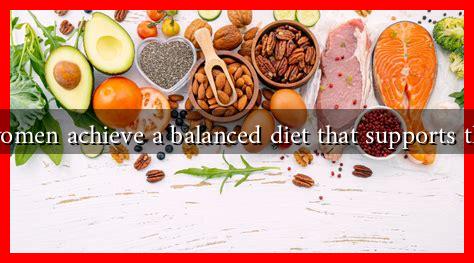-
Table of Contents
How Can Women Achieve a Balanced Diet That Supports Their Health?
In today’s fast-paced world, maintaining a balanced diet is crucial for women to support their overall health and well-being. A balanced diet not only helps in managing weight but also plays a significant role in preventing chronic diseases, enhancing mood, and improving energy levels. This article explores practical strategies for women to achieve a balanced diet, backed by research and expert recommendations.
The Importance of a Balanced Diet
A balanced diet is essential for women due to unique nutritional needs that vary throughout different life stages, including menstruation, pregnancy, lactation, and menopause. According to the World Health Organization (WHO), a balanced diet can help reduce the risk of chronic diseases such as heart disease, diabetes, and certain cancers.
Key Components of a Balanced Diet
To achieve a balanced diet, women should focus on incorporating a variety of food groups. Here are the key components:
- Fruits and Vegetables: Aim for at least five servings a day. These foods are rich in vitamins, minerals, and antioxidants.
- Whole Grains: Choose whole grains like brown rice, quinoa, and whole wheat bread over refined grains to increase fiber intake.
- Protein Sources: Include lean meats, fish, eggs, legumes, and nuts. Protein is vital for muscle repair and overall health.
- Dairy or Dairy Alternatives: Opt for low-fat or fat-free options to ensure adequate calcium and vitamin D intake.
- Healthy Fats: Incorporate sources of unsaturated fats such as avocados, olive oil, and fatty fish like salmon.
Understanding Nutritional Needs
Women have specific nutritional needs that can change based on age, activity level, and health status. For instance:
- Iron: Women of childbearing age need more iron due to menstruation. Foods rich in iron include spinach, lentils, and red meat.
- Calcium: Essential for bone health, especially during menopause. Dairy products, fortified plant milks, and leafy greens are excellent sources.
- Folic Acid: Crucial for women who are pregnant or planning to conceive. Leafy greens, beans, and fortified cereals are good options.
Practical Tips for Achieving a Balanced Diet
Here are some practical tips to help women maintain a balanced diet:
- Meal Planning: Plan meals ahead of time to ensure a variety of foods are included and to avoid unhealthy last-minute choices.
- Mindful Eating: Pay attention to hunger cues and eat slowly to enjoy meals, which can help prevent overeating.
- Stay Hydrated: Drink plenty of water throughout the day. Sometimes thirst is mistaken for hunger.
- Limit Processed Foods: Reduce intake of sugary snacks, fast food, and processed meals that are often high in unhealthy fats and sugars.
Case Studies and Statistics
Research shows that women who follow a balanced diet experience better health outcomes. A study published in the Journal of Nutrition found that women who adhered to a Mediterranean diet had a lower risk of cardiovascular diseases. Additionally, the American Heart Association reports that women who consume a diet rich in fruits, vegetables, and whole grains have a significantly lower risk of heart disease.
Conclusion
Achieving a balanced diet is essential for women’s health and well-being. By focusing on a variety of food groups, understanding specific nutritional needs, and implementing practical strategies, women can support their health effectively. Remember, small changes can lead to significant improvements in overall health. Prioritizing a balanced diet not only enhances physical health but also contributes to mental and emotional well-being. Start today by making informed food choices that align with your health goals!

